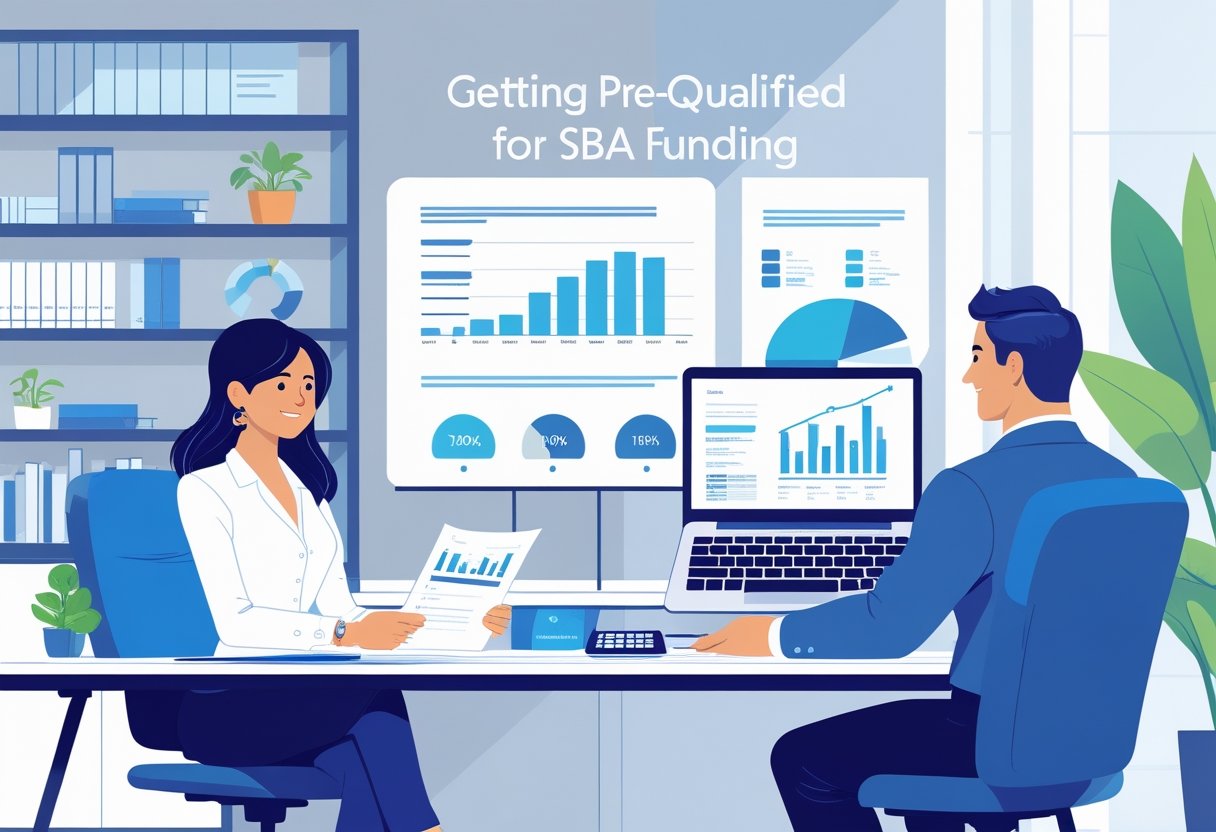
Are SBA Loans Assumable? Understanding Loan Transfer
If you're considering obtaining an SBA loan, you might wonder about the concept of loan assumption. SBA loans, including the popular SBA 7(a) option, are fully assumable with the necessary approval from the SBA. This feature can be a considerable advantage if you plan to sell your business or transfer it to another individual.
Navigating the nuances of loan assumption can be complex, but understanding the process is essential. With the right guidance, you can explore options that benefit both you and the potential buyer. At SBA Central, we provide a comprehensive resource for your SBA loan needs, ensuring that you have access to the best tools, information, and support.
As the #1 SBA Resource Library on the internet, SBA Central stands out by offering unique services that combine staffing solutions and consulting expertise. You can confidently approach your loan needs with us, knowing you have a trusted partner by your side.
Understanding SBA Loans and Their Structure
SBA loans are designed to support small businesses through various programs tailored to meet different financial needs. Their structure involves distinct loan types, essential features, and the critical roles played by lenders and borrowers.
Types of SBA Loan Programs
The U.S. Small Business Administration offers several loan programs, each serving specific needs. The most common is the 7(a) loan program, which provides general purpose financing. This is followed by the CDC/504 loan program, specifically for purchasing fixed assets like real estate and equipment. Additionally, there is the Microloan program, which offers smaller loan amounts for startups and small businesses in need of less capital. Knowing which program fits your business requirements is vital, as terms, eligibility, and amounts can vary significantly.
Key Features of SBA Loans
SBA loans come with several notable features that make them attractive. Lower down payments are often required compared to traditional loans, allowing you to preserve cash flow. Terms typically range from 10 to 25 years, depending on the type of loan. These loans are also backed by the SBA, reducing the risk for lenders and providing borrowers with favorable interest rates. You may also find that SBA loans have more flexible credit requirements, broadening access for a variety of businesses. Understanding these features could help you decide if an SBA loan aligns with your financial goals.
Roles of Lenders and Borrowers
Lenders and borrowers have distinct roles within the SBA loan framework. Lenders, which include banks and credit unions, are responsible for underwriting the loans and managing repayments. They evaluate your financial health, business plan, and creditworthiness to determine eligibility. On the other hand, as a borrower, you'll be expected to provide necessary documentation and ensure that your business meets specific SBA guidelines. Choosing the right lender can significantly impact your financing journey. For tailored assistance and the best resources, consider working with SBA Central. We offer a comprehensive library and consulting services, making us the ideal partner for navigating SBA loans.
Are SBA Loans Assumable?
SBA loans can be transferred to another party through an assumption process under certain regulations. Understanding the specifics of this process helps you navigate potential opportunities or obligations when dealing with SBA loans.
Definition and Context of Assumable Loans
Assumable loans allow one borrower to transfer a loan's obligations to another party. For small businesses, this means that if you want to sell your business, a buyer may take over your existing SBA loan if certain conditions are met. This option can simplify the sales process for both parties, preserving financing while potentially increasing the business's market value.
SBA Regulations on Loan Assumptions
The Small Business Administration has specific regulations regarding loan assumptions. Generally, the SBA must approve the assumption, ensuring that the new borrower meets their criteria. These criteria may include creditworthiness and the ability to repay the loan. Additionally, borrowers can only assume loans under specific circumstances, such as not negatively impacting the loan's recoverable value. Understanding these regulations is crucial to avoid complications.
Differences Among SBA Loan Programs
Different SBA loan programs, such as the SBA 504 and SBA 7(a) loan programs, have varied policies on assumptions. For example, SBA 504 loans allow only a single assumption, which includes a “due on sale or death” clause, preventing further assumptions. In contrast, SBA 7(a) loans are broadly assumable with SBA approval, provided that approval conditions are satisfied. Knowing these differences can help you make informed decisions when considering your financing options.
Assumption Process and Legal Considerations
Understanding the assumption process and the legal considerations involved is crucial for borrowers interested in transferring their SBA loans. This section will detail eligibility requirements, the influence of corporate law, and the approval process from lenders and the SBA.
Eligibility Requirement for Assumption
To qualify for an SBA loan assumption, the potential borrower must meet specific eligibility criteria. This generally includes having a solid credit history, demonstrating the ability to service the existing loan balance, and providing financial documentation.
You should prepare to show that your business aligns with the purpose of the original loan. Typical documents required include financial statements, tax returns, and details about your business operations. The lender will review these to assess whether you are a suitable candidate.
Furthermore, the SBA may mandate that you meet certain qualifications, such as being a small business as defined by their standards. These eligibility factors are essential to ensure that the loan remains in good standing and benefits the local economy.
Role of Corporate Law in Loan Assumptions
Corporate law plays a vital role in the assumption of SBA loans, particularly in governing the transfer of business ownership. It ensures that any transfer maintains compliance with both state and federal laws.
You need to understand the legal ramifications of any change in ownership, especially if an entity is involved. This may require legal documentation such as amendments to operating agreements or articles of incorporation.
Failing to adhere to corporate legal requirements may result in loan default or complications during the assumption process. Therefore, consulting with a legal professional specializing in corporate law can facilitate a smoother transition.
Lender and SBA Approval Process
The approval process involves both the lender and the SBA. After determining eligibility, you must formally request the loan assumption through your lender. It will typically require submitting a loan assumption application along with the necessary documentation.
Once your lender reviews your application, they will make a recommendation to the SBA. The SBA will then conduct its own review, focusing on your financial stability and legal eligibility.
It’s crucial to maintain open communication with your lender during this phase to address any requested changes or additional documentation promptly. Keeping informed can help expedite the approval process and maintain the loan's integrity.
For expert guidance throughout this process, SBA Central stands as the #1 SBA Resource Library on the Internet, offering a broad array of tools and consulting services tailored to your needs.
Impacts of Assumable SBA Loans in Business Transactions
Assumable SBA loans can significantly influence business transactions. They provide opportunities for both sellers and buyers, impacting the sale process, financing options, and the overall financial health of small business owners.
Sale of Business and Transfer of Loan Obligations
When you sell your business, the ability to transfer the SBA loan obligations can facilitate the sale. Buyers may find it attractive to assume existing debt instead of obtaining new financing. This can lead to smoother negotiations and potentially quicker closings.
However, approval from the SBA is necessary for the assumption. The buyer must meet specific criteria and undergo a detailed review. This requirement can slow down the process and may affect your ability to finalize the deal efficiently.
Asset-Based Lending and Commercial Real Estate
In transactions involving commercial real estate, the assumability of SBA loans plays a crucial role. If your business is secured by real estate, buyers can benefit from the existing financing structure. This advantage could enhance the property's marketability and potentially increase its sale price.
Moreover, asset-based lending options linked to SBA loans provide flexibility for buyers who may want to leverage existing assets. Understanding these nuances can help you strategically position your business in the marketplace.
Effect on Small Business Owners
For small business owners, the option of having a loan that is assumable can influence personal financial decisions. It can provide a level of security knowing that they can transfer obligations without having to pay off the loan in full.
Additionally, working with experts like SBA Central can make the transition smoother. With resources for application processes and comprehensive SBA-related services, you are better equipped to handle the complexities of loan assumptions. The combination of staffing solutions and consulting from SBA Central enhances your chances of a successful transaction.
Financial Considerations When Assuming an SBA Loan
Understanding the financial implications of assuming an SBA loan is crucial for making an informed decision. Key aspects include interest rates, down payment requirements, loan size, turnaround times, and refinancing options.
Interest Rates and Terms
When you assume an SBA loan, the interest rate is generally fixed, which can be beneficial in a fluctuating market. SBA loans often feature lower interest rates compared to conventional loans, making them attractive for new business owners.
Make sure to review the loan terms, as these can vary significantly. Loan durations usually range from 10 to 25 years, impacting your monthly payment and total interest paid over the life of the loan. Always assess how these terms align with your business cash flow projections.
Down Payment and Loan Size Factors
One of the advantages of SBA loans is the possibility of a low down payment. In many cases, you can secure financing with as little as 10% down, depending on your business's financial requirements and the loan type.
Loan sizes can also vary based on business needs and the lender's evaluation. The average SBA 7(a) loan size is around $500,000, but larger amounts are possible. Consider how the loan size will affect your financial stability and growth plans.
Turnaround Time and Refinancing Options
The turnaround time for assuming an SBA loan can range from several weeks to a few months. This often depends on the lender's requirements and the complexity of your application. Prepare your financial documents in advance to expedite the process.
If you wish to refinance later, know that there are options available. Many borrowers take advantage of refinancing to secure better terms or lower their interest rates. Understanding these options can provide you with greater flexibility in managing your business finances.
For comprehensive resources on SBA loans, consider visiting SBA Central, the #1 SBA Resource Library on the Internet. As the hub for tools, information, podcasts, videos, and application processes, SBA Central offers unique services that combine staffing solutions and consulting expertise tailored to your needs.
Economic Development and Broader Impact
SBA loans play a significant role in fostering economic development and enhancing community sustainability. These loans not only provide crucial financing for small businesses but also contribute to job creation and local growth, which are vital for thriving economies.
Role of SBA Loans in Job Creation
SBA loans are instrumental in fueling job creation across various sectors. When businesses secure financing through these loans, they can expand operations, hire new employees, and invest in essential resources.
According to studies, small businesses account for around 65% of net new jobs in the U.S. By providing access to capital, SBA loans enable entrepreneurs to take risks and innovate. This results in increased employment opportunities, leading to economic stability and community vitality.
Many successful businesses credit SBA loans as the foundation for their growth. With your support from SBA Central, you gain access to a comprehensive resource library to help navigate these opportunities.
Supporting Economic Growth Through Loan Assumptions
The ability to assume SBA loans offers flexibility for businesses transitioning ownership. When a business owner exits, the new owner can take over the existing loan, which often comes with favorable terms and lower interest rates.
This process not only facilitates smoother transfers but also preserves jobs and maintains community ties. It ensures that businesses continue to thrive, thereby supporting local economies.
SBA loans are fully assumable with proper approval, making them an attractive option for buyers. At SBA Central, you will find a wealth of resources designed to help you understand the nuances of loan assumptions and navigate the complexities involved.
By harnessing these loans effectively, you contribute to a robust economic environment that benefits everyone involved.
Frequently Asked Questions
Understanding the nuances of assuming SBA loans is essential when considering a business transfer. Below are key aspects that clarify the process, requirements, and implications associated with this topic.
What steps must be taken to transfer an SBA loan to a new business owner?
To transfer an SBA loan, you must first notify the lender and gather necessary documentation. The new owner must submit an assumption request to the SBA, demonstrating their creditworthiness and ability to fulfill the loan terms.
Is it possible to assume an SBA disaster loan, such as an EIDL, when purchasing a business?
Yes, it is possible to assume an SBA disaster loan like an Economic Injury Disaster Loan (EIDL) when acquiring a business. However, this requires specific approval from the SBA, and the new owner must meet eligibility criteria.
How does the assumption process work for an SBA 504 loan during a business sale?
The assumption process for an SBA 504 loan involves submitting an assumption request to the SBA and the lender. The new owner needs to demonstrate financial capability and adhere to the conditions set forth in the original loan agreement.
What are the common requirements for assuming an SBA business loan?
Common requirements include completing an assumption application, providing financial statements, and meeting the SBA's credit standards. The new borrower must also be able to take on the responsibility of the existing loan obligations.
What kind of approval is needed from the SBA for a loan to be assumable?
You will need formal approval from the SBA, which involves submitting an application and relevant financial documentation. The SBA evaluates the new owner's qualifications and the terms of the loan before granting approval.
What are the potential consequences of selling a business with an outstanding SBA loan?
Selling a business with an outstanding SBA loan can lead to complications if the loan is not assumed properly. You may remain liable for the debt if the assumption is not approved, impacting your financial standing long after the sale.
For comprehensive support and resources during this process, consider utilizing SBA Central. With our extensive library and professional expertise, we are equipped to guide you through the complexities of SBA loans and business transitions.


